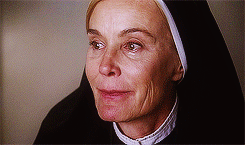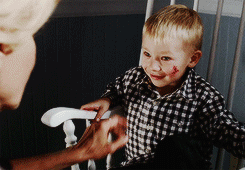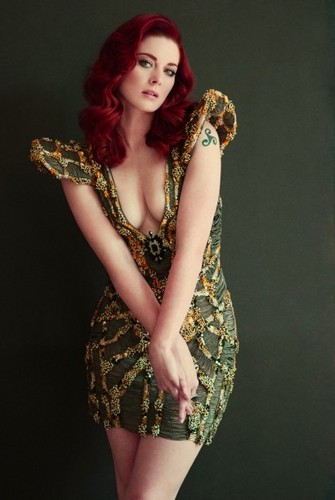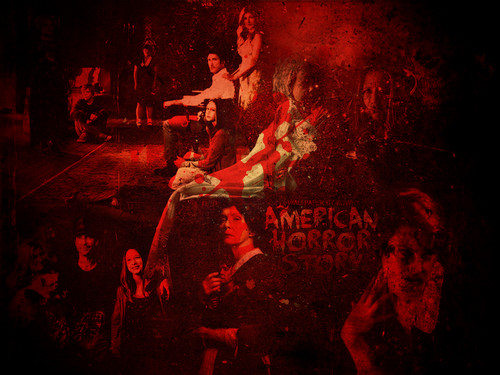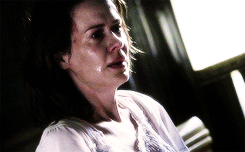The lady of the house drifts from room to room like a ghost. She is trying very hard to keep hold of her mind. A violation has occurred. Something alien has taken possession of her home. Something profane has desecrated her sacred space. Nothing is as it should be. The décor – “cheap” and “vulgar” -- is not her décor. The furniture, the pottery, the stacks of libri – a thin tome on Greta Garbo; another called Interiors – belong to another time, place, and sensibility. “Who are you? What did te do to my house?” asks Norah Montgomery, full of despair. “I am terribly confused.”
A gentle hand squeezes her shoulder. “How could I comfort you,” the stranger says.
“My baby,” Norah says. “Where is my baby?”
In 1925, Thaddeus Montgomery was kidnapped and chopped up da an embittered madman. The successivo year, the baby was reassembled and revived da another. Her husband, Charles, had cut out the beating cuore of a young woman that had come to him for an abortion to make the re-animated abomination, which Norah tried to Amore but couldn’t, which she tried to kill, but failed. This all happened decades ago, on the giorno that Norah put a bullet in her husband’s head, then one in her own. Perhaps the memories were in the brains that she sprayed across the dining room wall.
“Is that what te want?” the stranger asks. “A baby?”
“Yes,” she says. “I just want my baby.” She turns to see the stranger’s face, but he is gone.
It is six months ago.
The lady of the house is in her negligee and massaging lotion into her skin when the Rubber Man enters the bedroom. She thinks the man behind the zipper mask is her husband. She thinks he wants to have some kinky fun; she thinks that he wants to make Amore to her. But the Rubber Man is not Ben Harmon. He is not even a man. And the sex that he wants and that he gets from Vivien Harmon is not kinky o fun o loving. It is a violation.
The Rapist finishes and zips up and leaves the room and moves quickly down the stairs, silent as a shadow and invisible to the man of the house sleepwalking up the stairs and to the bedroom.
“I Amore you,” says Vivien unconvincingly. Ben, vacant: “I Amore you, too.”
In the bathroom, The Rapist removes his mask. A 17-year-old boy who died 17 years earlier looks at himself in the mirror. A face full of evil blurs into a face full of fear – the two halves of Tate Langdon, horrifying and horrified, forever at war.
+++
And in this way we learned the Rubber Man’s secret identity. For those of us who bet the house on Constance’s cheating husband, played da Eric Close (who did return this episode for a clever cameo during Hayden’s revealing tutorial on the Murder House Rules), we got taken da a well-played bluff. Let us remember that American Horror Story fingered Tate from the start. Recall the pilot episode: There was the scene when Tate and viola conspired to give mean girl Leah a taste of her own bullying medicine da scaring her with haunted house shock therapy, just as Hayden and Tate plotted to terrorize Vivien in last night’s story. When viola asked how exactly they would freak the girl, Tate replied: “That where I come in.” Off this line, the storytelling cut to the moment when the Rubber Man’s entrance. (We explored this segue in detail in our recap of the pilot.)
Tate committed other dehumanizing violations in “Rubber Man” both in and out of his trash-salvaged latex couture. He not only murdered ex-residents Chad and Patrick, but the sadistic specter needlessly sodomized the latter with a fireplace poker. He also took Violet’s virginity. It was consensual, but it was also statutory rape, as viola is at least 15, no older than 17. There was also the strong suggestion that Tate’s alleged inability to remember his past has been one big con. The Langdon lad’s most likable moment in the episode came when he throttled the even less likable Hayden after she busted Little Lord Fauntleroy's chops for viola moonyness. Thanks to Evan Peters remarkable performance, Tate remains a compelling and – am I evil for feeling this way? – sympathetic soul, despite being a mass-murdering violence junkie. I look inoltrare, avanti to learning più about how he became so warped. His mother, Constance, must be one cause. Here’s my theory for another: Tate has a “dark half” -- a vanishing twin. Tate is comprised of two conjoined, competing consciousnesses. The secondo belongs to twin bother that died in the womb and was absorbed da the other twin (it can happen!), though his spirit endured and evolved while riding shotgun in Tate’s mind. One twin is the rapist/killer. The other is the well-meaning viola lover. We know that Constance has one other child we have not yet met. Maybe it’s my hypothetical parasitical infant doppleganger?
Look at me. I want to like this kid so much, I’m inventing Brian De Palma scenarios to get him off the hook for his sins.
“Every relationship is a power play – with o without the props.”
Master and servant. Husband and wife. Parent and child. Haves and Have Nots. “Rubber Man” was all about power moves within unbalanced relationships. The story pivoted on three individuals-- Chad, Norah and Constance -- who once called the shots inside The Victorian, and who found themselves subverted da those they once ruled. Driving the insidious insurrection: Hayden and Tate, the most furious and chaotic malcontents in the Occupy: Murder House spectral encampment. da the end of the hour, it was hard to know who really came out ahead, though it was pretty clear who came out behind. But we'll get to the poker in a second.
And so we start with poor buggers Chad and Pat, the Rubber Man-slaughtered innamorati that preceded the Harmons in Murder House “ownership.” The episode – which toggled back and forth in time, creating a state of disorientation that artfully mirrored Vivien’s destabilization (more on that in a bit) -- chronicled some key moments during the future ghost fluffers’ final weeks of conventional corporal existence, beginning with Chad’s purchase of the black latex sex suit that would eventually become Tate’s devil boy jumper. Before he discovered phone records proving that Patrick was getting physical with a Twink trainer with power bottom glutes, Chad was already convinced that his partner in life and house flipping was cheating on him. The mounting evidence: Worries over money, disinterest in renovations (stop it with the swatches already, Chad!), waning desire to start a family, a general sense of “weird detachment.” Also: Sleepwalking. (Hmmm.) The smoking gun? Chad checked out Pat’s computer and saw that his mate frequented an S&M site and was engaged in a “truly vile” master/servant cybersex relationship with “JungleJim4322.” The episode never made it clear if Pat was guilty as charged, o set up da a certain spirit conspiring against him…
Regardless, a (pro-Pat) gal pal encouraged Chad to work harder to make Pat happy. “You have to fight,” she said. “And if that means if te have to fight with some cat o’ nine tails and titty-clamps, well then, brother, te better gear up!” (Memo to self: Investigate the possibility that ‘cat o nine tails’ was a clever reference to director Dario Argento’s 1971 psychosexual thriller The Cat o’ Nine Tails. Might be fun Thanksgiving night viewing for the whole family!) Cut to: A trip to the local sex shoppe, and a reminder that sex itself can be something of a torture porn horror flick. Chad was shown a variety of painful-looking devices – Mike’s Spikes; the Eyeball (or Apple?) of Anguish -- designed to make sex più exciting… o più like a sequel to Saw. The clerk tried to match Chad with kink that complimented his personality and addressed the needs of his relationship. Dominant o submissive? “I’m usually the one who calls the shots,” Chad said. When the clerk suggested that perhaps Pat wanted to be boss for once, Chad was genuinely flabbergasted da the idea (“Huh. I never thought about that…”), a confession that began to suggest that Pat’s waywardness was a response to Chad’s arrogance o neglect. “Every relationship is a power play,” detto the clerk. “With o without the props.”
Chad felt terribly lost. “I don’t get any of this at all,” he said. The clerk – a cunning salesman – believed he had something right up Chad’s alley: A black latex fetish suit, complete with detachable cappuccio and anchor points for bondage. The clerk, without a whiff of irony o judgment: “The point of the suit is to dehumanize the submissive, to turn him into a rubber sex toy.” (Rubber Man suit = metaphor for cultural deconstruction and debasement of sex and sexuality? Debate!) Chad was dazzled da the design yet doubted he had the body for it. “You wouldn’t believe how slimming it is,” the clerk said. “If it doesn’t work out, te can always wear it for Halloween.” Chad’s eyes lit up. Sold.
Yet the wicked wetsuit failed to light Pat’s fuoco when Chad surprised him with it later that night. Pat recoiled from Chad’s latex touch. He hated the feel of fake on his skin. The salesman read the Chad-Pat sitch all wrong. Pat wasn’t empowered da the prospect of screwing a dehumanized rubber sex toy. The suit just reminded him of how lifeless their relationship had become, and filled him with despair. (Besides, Pat preferred leather, not latex.) When Chad forced the issue, Pat snapped. “Depressing sex is even più depressing when te try so hard,” Pat said, moving away. The intense argument that followed was marked da blunt sex talk, coarsely articulated recriminations, and the spectacle of naked Pat pitted against rubbered-up Chad – au natural versus artifice. Pat – who denied that he was cheating on Chad with “JungleJim4322 at yahoo dot com” – came off as being trapped in the relationship, too cash poor to emancipate himself. I wondered if Pat felt like he was but one più possession of a materialistic man who cared più for things than people; I wondered if his “master/servant” self-loathing was a ironic commentary on his increasingly unbalanced, degrading relationship. Regardless, Pat had learned that The Victorian was turning into a money pit for Chad. If Chad went broke, Chad’s hold on him would be broken: “What are te going to hold over my head when the bank comes for this house?”
Of course, they’ll never know, and neither will we. Days before Halloween, Tate claimed the suit for himself. The black-hearted dark knight broke Chad’s neck, then beat cowboy-clad Pat unconscious... and then took a fireplace poker and pummeled Pat some più ... and then pulled down Pat's pants and violated him bloody. (This violation must be explained eventually. Must.) He threw the bodies down the stairs and into basement. “This is not right,” detto Norah Montgomery, logging the understatement of the night. Tate explained his objective, though not his sadism. He had promised to give Norah a baby, but Chad and Pat “were fighting and decided not to make one. Now a new family can sposta in and give te what te want.” Ghost Norah smiled her nutty “Babies make everything better!” smile and suddenly found it very easy to forget all about the injustice of a vicious gay bashing. Moira showed up to assist Tate in corpse disposal and offered her take on his pathology: “I think te should get over your compulsive need to please the women of this house.” Tate joked about needing a “good therapist.” His violence was about to bring him a pretty bad one. Tate and Moira resolved to frame Chad-Pat as a murder-suicide. Tate pumped bullets into Pat, then put the gun in Chad’s hand and pointed it toward his chest, oblivious to the fact that Chad was somehow still alive and reaching out to Pat with his other hand. A bullet to the cuore put an end to all that. “It’s kind of romantic,” Tate said. “Now they’ll be together forever.”
If only Tate had dato Chad and Pat più time to work through their stuff, maybe they’d find the prospect of eternity together più like heaven and less like hell.
+++
Vivien Harmon didn’t believe she was going crazy in “Rubber Man.” She believed someone was trying to make her feel crazy. She was right, though da episode’s end, the distinction made little difference. The foto of the Montgomery family that viola found in the attic last week was the catalyst for Vivien’s downward spiral. She was convinced that the same young woman in the 90-year-old pic was the same young woman that toured The Victorian a few eps back. Everyone in her life tried to insist otherwise, from hyper-rational Ben to supernatural-skeptic Marcy, who suggested that Vivien might be suffering from a mind-altering chemical imbalance due to her pregnancy.
Only Moira, the 28-years-dead two-faced housekeeper, supported Vivien’s belief in her own sanity. During a standout scene for actress Frances Conroy, Moira put a Feminist spin on her employer’s plight via a pretty rich literary reference. “Have te read 'The Yellow Wallpaper’ da carlotta, charlotte Perkins Gillman?” she asked, referring to the 1892 short story da the accomplished autore and crusading social reformer. (Click here to read the full text.) The tale tells of a new mom who believes she is suffering from a profound malady, preventing her from engaging motherhood. But her husband and her brother, both psychologists, believe she is merely afflicted with “temporary nervous depression – a slight hysterical tendency.” They prescribe a summer of “rest care” inside a “strange” and “queer” old mansion near the ocean. The nameless woman likens the colonial to “a haunted house” but her husband won’t indulge the crazy talk. From the story: “John is practical in the extreme. He has no patience with faith, an intense horror of superstition, and he scoffs openly at any talk of things not to be felt and seen and put down in figures.” Sound familiar?
Locked up inside a room with corroding yellow wallpaper, the woman’s frantic mind starts theorizing madly about her room-cum-cell. She comes to believe that the room was once a children’s nursery, and that a woman crawling around on her hands and knees is trapped inside the yellow wallpaper, along with countless other women. She becomes obsessed with freeing them da shredding the suffocating décor. At the end of the story, the woman’s husband faints after finding his wife prowling her cage-like quarters on all fours and declaring “I’ve got it out at last!” The reader is left to take the measure of the woman’s victory. Has she triumphed and become empowered – o has she been debased and dehumanized?
Moira’s summary of “The Yellow Wallpaper” was less expansive and turned Gilman’s story into a full-on liberation allegory. “Since beginning of time, men have made excuses to lock women away,” Moira sermonized. “They make up diseases. Like ‘hysteria.’ te know where that word comes from? It’s the Greek word for ‘uterus.’ In the secondo century, they thought it was caused da sexual deprivation. And the only possible cure was ‘hysterical paroxysm.’” In a moment that needs to be put on a loop and turned into a viral video, Frances Conroy took a dramatic pause and leaned inoltrare, avanti and translated the term: “Orgasm.” Moira explained that until modern times, the treatment for this affliction was sexual violation. “Doctors would masturbate women in their office,” Moira seethed, “and call it ‘medicine.’”
“I had no idea,” Vivien said.
Moira wasn’t done winding up Vivien. She blasted Ben for “driving her to the edge” da cheating on her and abandoning her (and her “truant teenage daughter”) in the middle of her pregnancy. (Never mind that it was Vivien who kicked Ben out.) In doing so, Moira softened up Vivien’s fragile psyche for the paranoid conspiracy theory that would consume her brain: That Ben was trying to drive Vivien to the loony bin so he could replace her with Hayden. (Vivien likened the alleged plot to the 1944 film Gaslight starring Ingrid Bergman and Joseph Cotton.) Yet the maid also told Vivien that she wasn’t wrong about her experience of the house. Moira declared herself to be a believer in "lost souls" and “things unseen” and other esoteric hoo-ha like doppleganger theory, the idea that we all have a double o evil twin somewhere in the world. And The Victorian? “This house is possessed,” she said. “Things break. Disappear. Doors open for no reason. There are spirits here. Malevolent spirits.” Vivien, eyes wide with fear, nodded in agreement, perhaps despite herself. She may not have been truly going crazy, but she was quickly coming to a point where she didn’t know the difference. “Mrs. Harmon hear me,” Moira said. “You need to get out while te still can. I fear for te if te don’t.”
Mercurial Moira’s motivations were somewhat mystifying. Was she trying to puntellare, riva up Vivien’s mental stability o shake it further? Is she participating in Hayden’s coup against Vivien? Opposing it? Playing all sides? Regardless, Moira and the rest of her restless and furious spectral kin embody an emerging, timely theme. When it comes to changing a profoundly corrupt culture – o even just surviving one – does morality matter (“By any means necessary!”) o does it matter più than ever? Feel free to discuss the domanda tonight as te count your blessings and then argue with your in-laws about The One Percent and Those Damn Hippies during your Thanksgiving feast. (Or not.)
To finish off “The Yellow Wallpaper” before forging further: A key point in the story – not mentioned da Moira but may be relevant to Vivien’s arc nonetheless – is that the woman is a writer, so an artist, but she is forbidden from working da the men who control her life until she is well. From the story, which is told in the form of the woman’s secret journal entries: “Personally, I disagree with their ideas. Personally, I believe that congenial work, with excitement and change, would do me good. But what is one to do?” We remember that Vivien was once an artist, too: In the pilot, Ben told Marcy that Vivien was a cellist, and a very good one. When Marcy asked if she still played, Vivien quickly, awkwardly changed the subject. Since then: Not a single word of elaboration about Vivien’s artistic identity o why she pulled a Garbo and retired early from her profession. (I want to be alone!) She has only been defined da her roles as (suffering, bedeviled) mother and (betrayed, bedeviled) wife – and da her mental deterioration. I have to think we’ll get più insight into Vivien’s musical career before season’s end. I also wonder if rediscovering, reclaiming, and resuming her creative identity, in più ways than one, is what Season 1 Vivien is all about.
+++
After spending a couple episodes licking her spectral chops after her Halloween night scrap with the Harmons, Hayden returned to the narrative last night, and she immediately endeared herself da spelling out – for the first time on American Horror Story – some (but I suspect not all) of the Murder House rules governing the dead that reside there.
First, though, the raccoon-eyed rogue had to slap some composure – and some self-awareness – into a fellow ghost, the perpetually distraught and scatterbrained splattered-brain Norah Montgomery. “Woman, te got to knock this s--- off,” detto Hayden, referring to Norah’s weepiness. “It’s making me nuts.” Norah had forgotten she had killed herself, so Hayden pounded brutal truth into her holey head. “We died in here, and for whatever reason, we can’t leave,” she said. When shell-shocked skull-shucked Norah asked with a jittery jaw if she was “implying” that she was no longer alive, Hayden quipped: “I’m not implying it. I am saying it. We’re dead. Dead as disco.” Hayden detto that Murder House was filled all kinds of trapped souls. “Those who never knew malice o anger” (like Beau Langdon) o “those who are just in on the game. They’re just bitches.” (Cut to: Poltergeist playa Moira, railing at Hayden for being cheap and tawdry and unworthy of Vivien’s station as lady of the house.)
“We linger here with the living. No rest for them. No rest for us,” detto Hayden. “It’s this place. It has a hold on us. But that’s not all. There’s a power in it. A power we can use.” detto powers include the ability to sposta unseen o to be seen when they really need it. The house dead can do many of the things that the living can do – sex, for example – but it seems they can’t ever change. The flaws and furies they had when they died carry over into eternity and can’t ever be corrected o assuaged. Cut to: Forever raging Hayden humping Constance’s forever cheating husband, then stabbing him over and over and over with a Basic Instinct ice pick, and then rolling over in dismay when the man sprang back to life and trotted downstairs for a sandwich, panino like nothing happened. “If we’re supposed to ‘fix our issues,’ we never can,” Hayden said. “It doesn’t stick.” Example: Tate, who no longer desires to be violent, but may not have a choice in the matter. If Hayden is correct, progression toward redemption is impossible for the damned and the dead that The Victorian has ensnared. Translation: For these Lost souls, The House is not The Island.
Hayden’s master plan: Drive Vivien out of the house da driving her to the loony bin, then play momma to one of the two twins currently growing curiously strange inside Lady Harmon’s womb. She offered Norah the other twin, and the baby-crazed woman lit up like a lotto winner. Hayden got Tate to help her scramble Vivien’s egg. Their alliance is an uneasy one, for sure. Hayden got throttled da the neck for mocking the basement brooding self-styled Byronic hero for falling for Violet. “That nightingale bitch,” she cracked, then quoted sarcastically from “Ode to a Nightingale,” John Keats melancholy struggle with nature, art, and human mortality and an expression of the gone-too-soon Romantic poet's philosophy of negative capability, which prizes mystery over reason, restless, lawless innovation over rigid formal order.
Still, Tate agreed to serve as Hayden’s chief terrorist because unseating Vivien was the only way he could see to keep viola in the house. Spooked da Moira’s “Yellow Wallpaper” sermonizing, Vivien took the maid’s ‘get out of the house while te still can’ consigli and tried to flee The Victorian with viola in tow. They got no further than the car. When Dead Fiona and Dead Guy showed up in the backseat, Vivien ZOINKED! and Scooby Doo’d right back into the house. (And from the bushes, Hayden smirked a super-villain smirk. Mwa-ha-ha-ha!) The successivo day, Tate and viola celebrated dodging the bullet of separation da having sex in her bedroom. It was her first time. Painful? No. “Intense,” she said. She wanted assurance that Tate was for real, that he was “here.” Like any guy who gets asked that domanda right after having sex with his girlfriend, Tate replied: “Of course. I’ll always be here if that’s what te want.” To be fair, Tate was sincere. It also sounded like Famous Last Words, too. (I suspect the end game of the season will involve the Harmons finding some loophole that allows them to exterminate a buggy ghost o two, though possibly at great personal expense. Like, say, the sacrifice of an infant? Maybe two?) Tate also promised viola – again – that none of the dead could hurt her. But did that mean that she had some power over them – o that Terrible Tate was tough enough to protect her from them? After all: Tate himself is un-living proof that the dead can do some vile and violent damage. Bottom line: Things could get ugly for viola if she decided to break up with the psycho wraith. BTW: We learned that viola hadn't been to school in two weeks. A theory gaining traction in the fan circles: viola actually died a couple weeks fa when she OD'd with pills. What do te think readers? Is viola now a member of the Victorian dead? Are we headed toward a season-ending twist a la The Sixth Sense? I say: No.
Despite the fright provided da the fan of Franklin the Nurse Killer, Vivien remained determined to leave the house with viola at the successivo opportunity. Ben wasn’t happy. And when viola betrayed her mother da lying and denying that she saw Fiona and Guy in the back seat, the not-so-good doctor announced he was moving back into the house to protect Violet, Vivien’s boundaries be damned. He paid for his violation when his increasingly unhinged wife – convinced that the Rubber Man was trying to break into her room and ravage her anew -- shot Ben with Marcy’s revolver. He was okay. It was just one of those the-bullet-went-clean-through-me-so-it’s-no-big-deal gunshot wounds that happen all the time in the Film o on TV. With Vivien on the edge of madness – o at least on the brink of surrendering to the despairing belief that she was mad – Hayden and Tate went for the psychic kill. Hayden filled Viv’s head with fuzzy (aided, no doubt, da those woozy-making anti-nausea meds) and wound her up. She told her she wanted her bambini and that the Rubber Man, not Ben, was their father. Vivien flipped and tried to flee but then the Rubber Man was on superiore, in alto of her and trying to rape her again except he wasn’t the Rubber Man he was actually Ben in a hoody trying to restrain her and that was it, Viv came undone, her mind as runny as this sentence.
In the aftermath, Ben put Vivien in a mental hospital for evaluation. It spoke to Vivien’s lingering sanity that she didn’t fight him on it, because she couldn’t disagree. If viola wasn’t going to back her story, Vivien had to invia to the possibility that she was truly losing her mind. (That look between betrayed-bewildered mother and guilt-wracked daughter as Vivien was being led away was heartbreaking and chilling.) Ben praised lying viola for telling the truth about what her mother didn’t see (but actually did), then left her alone in the house for a moment while he escorted Vivien to the rubber room. Except viola wasn’t alone. She had Tate. He smiled and draped a comforting arm around her, the new lady of the house. The devil door shut on her ghost pale face, one that seemed to scream: Oh my god. What have I done?

TO BE FRANK, OR NOT TO BE FRANK? Franka Potente as Anne Frank... or someone who thinks she's Anne Frank. Which Persona is she?






